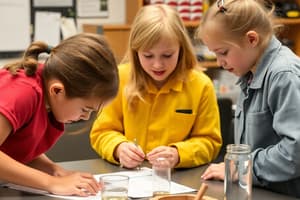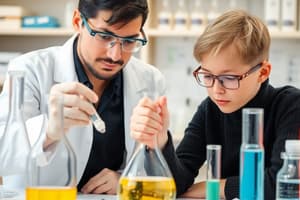Podcast
Questions and Answers
What is the first step in performing consecutive binary classifications?
What is the first step in performing consecutive binary classifications?
- Classifying objects based on height
- Identifying properties of the objects (correct)
- Communicating results
- Measuring quantities
Measuring is merely comparing a property to a unit.
Measuring is merely comparing a property to a unit.
True (A)
What does manipulation in a laboratory context refer to?
What does manipulation in a laboratory context refer to?
How living organisms, apparatus, and equipment are handled.
The first step in an experiment reporting process is to include the _______.
The first step in an experiment reporting process is to include the _______.
Match the classification categories with examples:
Match the classification categories with examples:
Which of the following is NOT part of the reporting steps in a scientific experiment?
Which of the following is NOT part of the reporting steps in a scientific experiment?
Interpreting data does not involve identifying trends or patterns.
Interpreting data does not involve identifying trends or patterns.
What are the two parts of a measurement statement?
What are the two parts of a measurement statement?
What is the primary function of observation in the scientific process?
What is the primary function of observation in the scientific process?
Qualitative observations rely solely on numerical measurements.
Qualitative observations rely solely on numerical measurements.
What is an inference?
What is an inference?
The process of grouping objects based on similarities and differences is known as ______.
The process of grouping objects based on similarities and differences is known as ______.
Match the following scientific process skills with their appropriate descriptions:
Match the following scientific process skills with their appropriate descriptions:
Which of the following methods is NOT a method of classification?
Which of the following methods is NOT a method of classification?
Communication can only occur verbally.
Communication can only occur verbally.
List two methods that can be used for communication in science.
List two methods that can be used for communication in science.
What is the first step in measuring using a scale?
What is the first step in measuring using a scale?
Qualitative observations involve using measuring instruments.
Qualitative observations involve using measuring instruments.
What term describes observations made using measuring instruments?
What term describes observations made using measuring instruments?
Scientists use special science _________ when conducting experiments.
Scientists use special science _________ when conducting experiments.
Match the following terms with their definitions:
Match the following terms with their definitions:
What is the primary focus of science process skills?
What is the primary focus of science process skills?
Quantitative observations are made using only our senses.
Quantitative observations are made using only our senses.
What is an inference in scientific observations?
What is an inference in scientific observations?
To classify items, scientists use _______ to group similar objects together.
To classify items, scientists use _______ to group similar objects together.
Match the measurement tools with their corresponding physical properties:
Match the measurement tools with their corresponding physical properties:
Which of the following is NOT a science process skill?
Which of the following is NOT a science process skill?
Measuring is primarily concerned with qualitative observations.
Measuring is primarily concerned with qualitative observations.
List two methods used to communicate scientific findings.
List two methods used to communicate scientific findings.
Flashcards
Observation
Observation
Using your senses (sight, sound, touch, smell, taste) to gather information about something.
Qualitative Observation
Qualitative Observation
Describing something using words instead of numbers (e.g., the leaf is green).
Communication
Communication
Sharing observations effectively with others.
Inference
Inference
Signup and view all the flashcards
Comparing
Comparing
Signup and view all the flashcards
Classifying
Classifying
Signup and view all the flashcards
Prediction
Prediction
Signup and view all the flashcards
Science Process Skill
Science Process Skill
Signup and view all the flashcards
Binary Classification
Binary Classification
Signup and view all the flashcards
Multi-stage Classification
Multi-stage Classification
Signup and view all the flashcards
Measurement
Measurement
Signup and view all the flashcards
Manipulation (in experiments)
Manipulation (in experiments)
Signup and view all the flashcards
Interpretation
Interpretation
Signup and view all the flashcards
Recording
Recording
Signup and view all the flashcards
Reporting
Reporting
Signup and view all the flashcards
Experimental Steps
Experimental Steps
Signup and view all the flashcards
Quantitative Measurement
Quantitative Measurement
Signup and view all the flashcards
Scale Marks
Scale Marks
Signup and view all the flashcards
Reading a Scale
Reading a Scale
Signup and view all the flashcards
Study Notes
Scientific Process Skills
- Observation is a fundamental scientific skill.
- We observe objects and events using our five senses (sight, smell, touch, taste, hearing) to learn about the world.
- Good observation is essential for developing other scientific skills. These skills include communication, classifying, measuring, inferring, and predicting.
- Qualitative observations use only the senses to describe something, for example, a leaf is light green or smooth.
Communication
- Communication is a science process skill that goes hand-in-hand with observation.
- Students must communicate observations to share them with others.
- Effective communication involves clear and understandable information.
- Students can communicate verbally, in writing, or through visuals (diagrams, charts, maps, etc.).
Inferring and Predicting
- Inferences are explanations or interpretations based on observations, unlike direct observation.
- For example, observing an insect releasing a sticky dark liquid could lead to an inference that the insect is upset and defending itself.
- Making inferences helps us understand and explain events in our environments.
Comparing and Classifying
- Grouping things based on similarities, differences, and relationships is comparing and classifying.
- This process is important in understanding the world around us.
- Comparisons help us notice similarities and differences.
Methods of Classification
- Binary Classification: Dividing a group of objects into two subsets based on a particular property (e.g., animals with or without backbones.)
- Multistage Classification: A series of consecutive binary classifications, used for more complex groupings (e.g., plant and animal kingdoms.)
- Serial Ordering: Arranging objects in rank order based on a certain property (e.g., students ranked by height.)
Measuring and Manipulating
- Measuring is a specialized form of observation and communication.
- Measurement involves comparing a property to a defined referent (unit).
- A measurement statement has two parts: a number (how much or how many) and a unit (what the number represents).
- Measurements are quantitative observations.
- Manipulation involves handling living organisms or equipment according to a procedure in a lab setting.
Interpreting
- Interpretation involves finding patterns and trends from observations.
- It is used to identify problems and potential solutions, enabling conclusions to be drawn.
- Calculations and explanations can support observations.
Recording and Reporting
- Recording involves representing observations using graphs, tables, or other displays.
- Reporting involves systematically documenting experiments or observations.
- Reports include information such as the title, date, aim, materials and methods, results, analysis, and conclusions.
Studying That Suits You
Use AI to generate personalized quizzes and flashcards to suit your learning preferences.




